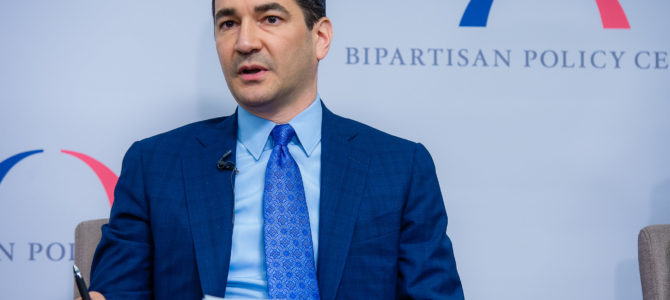Former Food and Drug Administration (FDA) Commissioner Scott Gottlieb has taken on a new role in the era of the Wuhan coronavirus as an expert in the realm of infectious diseases, appearing on multiple media platforms to expound on the response to the virus. On Sunday’s Face The Nation on CBS, Gottlieb expounded at length on infectious disease, predicting that “the scenes out of New York are going to be shocking.”
One problem: Gottlieb is not an expert on the spread of infectious disease, and has never focused on that area of health policy work. In fact, he is best known for his role at the FDA in fomenting a deceptive moral panic over vaping.
Gottlieb’s reputation has long been as an industry man representing the interests of Big Pharma – not someone who concentrates on global health or pandemics. His career has been a revolving door between Big Pharma and big government – currently, he serves on the boards of major pharmaceutical companies Pfizer, Illumina, Aetion, and Tempus, as well as a partner with a twenty billion dollar venture capital firm.
To be clear, Gottlieb is no dummy. His resume however, shows a smart guy serving as a mouthpiece for the pharmaceutical industry whose most recent high-profile job at the FDA was focused on inducing a moral panic around vaping. But rather than concentrating on more pressing health policy matters, Gottlieb spent his time as FDA commissioner between 2017 and 2019 raising misplaced hysteria over use of electronic cigarettes.
Now, the government bureaucrat who scared millions of smokers from making the life-saving switch is being looked to for guidance on navigating the global pandemic surrounding the Wuhan virus.
Prior to jumping into bed with pharmaceutical companies in 2007, Gottlieb was an advisor for the FDA and Centers for Medicare and Medicaid Services (CMS). During that time, Gottlieb developed limited experience in the field of infectious diseases serving as a member of the White House Biodefense Interagency Working Group formed after 9/11 to draft strategic plans for a U.S. biodefense countermeasures.
Gottlieb then left government work in 2007 to join the health care division of the venture capital firm New Enterprise Associates (NEA) and worked there for a decade until his appointment to lead the FDA. Over the ten years leading up to his time running the FDA, Gottlieb raked in millions from the pharmaceutical industry, forcing the nation’s drug regulator-in-chief to recuse himself from any agency decisions that related to about 20 health care companies.
At the FDA, Gottlieb’s lasting legacy is being the anti-vaping crusader on a mission to panic an anxious public about the use of vaping products proven to save lives. Gottlieb declared youth vaping an epidemic, brought down the hammer on e-cigarette makers conducting raids and undercover operations on facilities, and deterred smokers from making the decision to use a safer alternative.
Meanwhile, vaping has been proven to be the single most-effective form of smoking cessation and is 95 percent safer than using traditional combustible cigarettes, according to a groundbreaking study by Great Britain’s public health agency in 2015.
Part of Gottlieb’s public panic campaign featured prominently on using children to hype up the hysteria, formally declaring an epidemic of youth vaping in 2018. At first glance, the data from the Centers for Disease Control (CDC) to justify the action was indeed alarming. The CDC reported “current e-cigarette use” among teens had spiked from 1.5 percent in 2011 to more than 20 percent in 2018, with a 78 percent increase just from 2017 to 2018.
A closer look at the data however, reveals no such epidemic, as the CDC defines “current e-cigarette use” as any teenager who has vaped just once in a 30-day period. That includes teens who have simply tried products out of curiosity or those trying to look cool at a party, but who are not habitual users.
One would think that the head of the FDA would have known better. Instead of encouraging smokers to make the switch, Gottlieb pushed smokers to make the quit. Almost any smoker will tell you, that’s no easy feat.
After Gottlieb’s two years leading the disinformation campaign against e-cigarettes at the FDA, millions of smokers remain afraid to “risk” using e-cigarettes to quit smoking, the leading cause of preventable death in the United States, and new government regulations to clamp down on manufacturers are on their way.
Gottlieb coordinated a mass panic over vaping and never led an active effort against an infectious disease outbreak. The idea that he is now supposed to be taken seriously in the midst of a global pandemic over the Wuhan virus credits him with a level of expertise he has not earned, and ignores the many exaggerations and untruths he advanced on the vaping issue.









